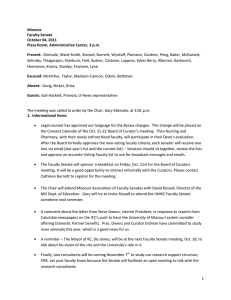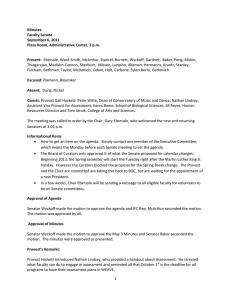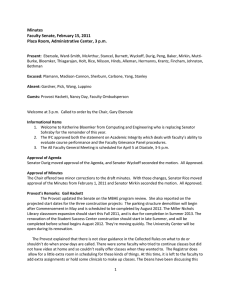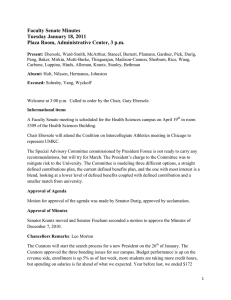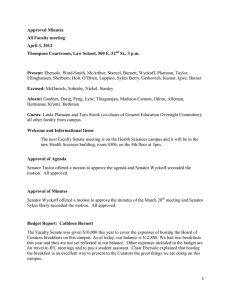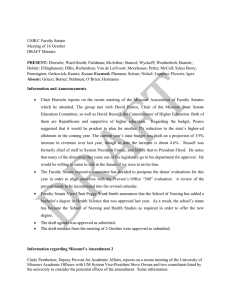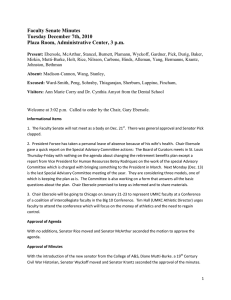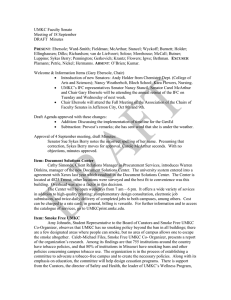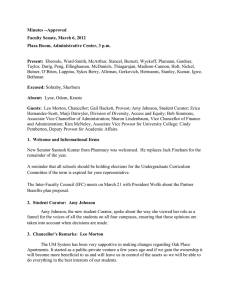Faculty Senate Minutes Tuesday November 16 , 2010
advertisement
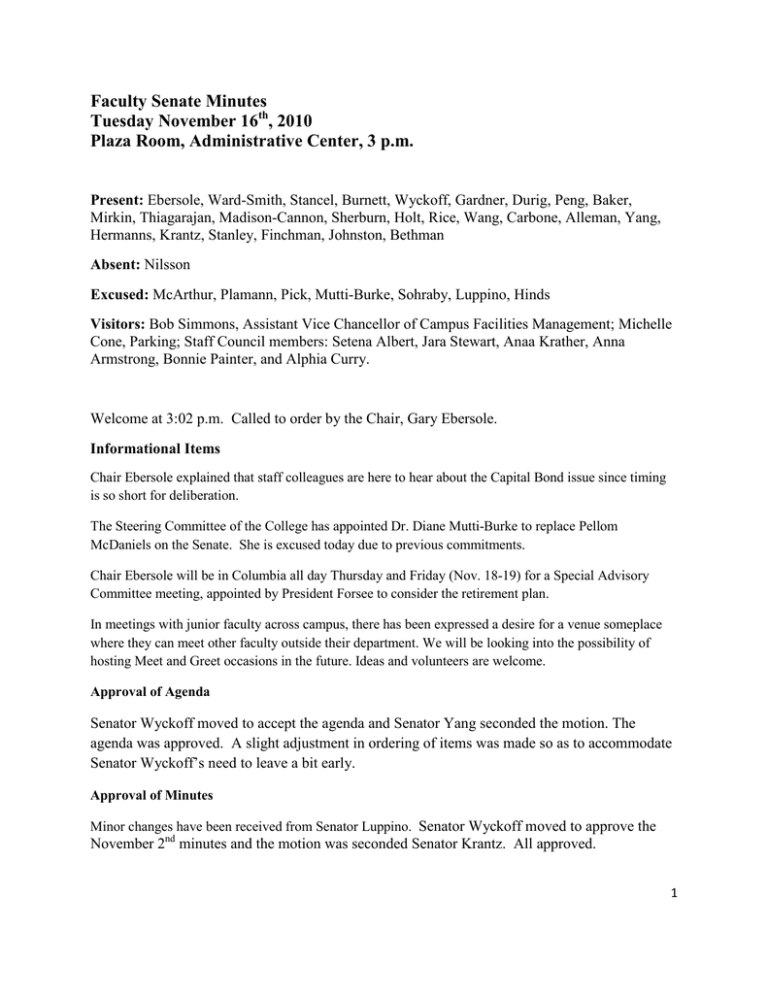
Faculty Senate Minutes Tuesday November 16th, 2010 Plaza Room, Administrative Center, 3 p.m. Present: Ebersole, Ward-Smith, Stancel, Burnett, Wyckoff, Gardner, Durig, Peng, Baker, Mirkin, Thiagarajan, Madison-Cannon, Sherburn, Holt, Rice, Wang, Carbone, Alleman, Yang, Hermanns, Krantz, Stanley, Finchman, Johnston, Bethman Absent: Nilsson Excused: McArthur, Plamann, Pick, Mutti-Burke, Sohraby, Luppino, Hinds Visitors: Bob Simmons, Assistant Vice Chancellor of Campus Facilities Management; Michelle Cone, Parking; Staff Council members: Setena Albert, Jara Stewart, Anaa Krather, Anna Armstrong, Bonnie Painter, and Alphia Curry. Welcome at 3:02 p.m. Called to order by the Chair, Gary Ebersole. Informational Items Chair Ebersole explained that staff colleagues are here to hear about the Capital Bond issue since timing is so short for deliberation. The Steering Committee of the College has appointed Dr. Diane Mutti-Burke to replace Pellom McDaniels on the Senate. She is excused today due to previous commitments. Chair Ebersole will be in Columbia all day Thursday and Friday (Nov. 18-19) for a Special Advisory Committee meeting, appointed by President Forsee to consider the retirement plan. In meetings with junior faculty across campus, there has been expressed a desire for a venue someplace where they can meet other faculty outside their department. We will be looking into the possibility of hosting Meet and Greet occasions in the future. Ideas and volunteers are welcome. Approval of Agenda Senator Wyckoff moved to accept the agenda and Senator Yang seconded the motion. The agenda was approved. A slight adjustment in ordering of items was made so as to accommodate Senator Wyckoff’s need to leave a bit early. Approval of Minutes Minor changes have been received from Senator Luppino. Senator Wyckoff moved to approve the November 2nd minutes and the motion was seconded Senator Krantz. All approved. 1 Provost’s Remarks: Gail Hackett The Provost first discussed the Missouri Department of Higher Education (MDHE) program review mandated by the Governor. The initial submitted report received pushback, so this campus submitted a revised report. MBHE insists that we do another round of reviews on eight additional programs. Many other universities got a similar request. The State added foreign language programs to the list across the state. The UMKC programs will be reviewed as part of the Task Force, which is in the process of creating a program review committee. There won’t be any decisions without meaningful faculty involvement. The Provost next discussed increasing efficiency through course redesign. We (and the other public four year institutions in Missouri) have consulted with Carol Twig, National Center for Academic Transformation (NCAT) who will be working with us for the next three years, redesigning 13 courses, with priorities in three areas: Introduction to Biology, College Algebra and Chemistry. Each institution gets to pick a course to focus on. But we will get to use the course that’s developed in all thirteen areas. Participate in all thirteen, but our area is Introduction to Biology, both 118 and 119, majors and nonmajors. For the Biology redesign, we are interested in reducing the reliance on physical lab space. We will begin with Chemistry 160: Society and the Environment, but that doesn’t mean that’s where we end. Once you learn the redesign process, we can use the principles and apply them to any course. Faculty are leading this movement at every level. NCAT is sponsoring a workshop in getting started in course redesign in Baltimore. If anyone’s interested in attending, the Provost is offering pay for half of your travel. Check it out, check out website and talk with your Dean if you have any interest. Chair Ebersole asked whether the Provost was able to talk about the search for Ron MacQuarrie’s replacement. Provost Hackett responded that a job description is going through the Hiring Freeze Committee in hopes of starting a national search as soon as possible. There are no plans to hire a search consultant. For a Dean of the Graduate School, we would expect candidates to have graduate faculty experience and to have served on a graduate council and experience related to a graduate school. It is expected that the Hiring Committee will be up and running and position advertised before the holidays. Ron will stay on part-time after March if needed. Senator Peng asked if this is also a faculty position? Answer: Yes, but if they’re a Chemist, for instance, then the Chemistry Department will consider the candidate and make that appointment. Senate Sentiment of the One Time Funds Draft Proposal Chair Ebersole explained the vote to be considered next is for a one-time faculty-staff “bonus” as thanks for generating additional funds through increased efficiencies and student success as a whole campus in 2010. This ‘bonus’ would be on top of the 2 percent pay raise built into the budget. Senator Yang noted that he believed everybody liked the idea, but we’re pretty skeptical that this will actually come true. Senator Wyckoff commented that the money was welcome and would be a useful incentive for staff. But there might be places to spend where there would be more of an impact to recruit and retain students. 2 Concerns were raised that this proposal would mitigate the university’s responsibility to reward performance with faculty salary increases. In the extreme, it might also create a conflict of interest as faculty could receive a reward in exchange for students receiving good grades. Provost Hackett responded that such conflict is not the problem we have with student success at this university. We’re losing students for a complex of other issues. She will show us the US News and World Report statistics. We used to be in the third tier, but those graduation rates dragged us down to the fourth tier. Those graduation rates are pitiful despite the fact that our demographics show we should be a lot higher. Chair Ebersole suggested that the Provost come back to explain problems with student retention and to address Senator Peng’s question about what faculty can do. The Provost noted that a short presentation isn’t enough time, but announced that a Spring retreat for faculty is planned. Other comments discussed whether the ‘bonus’ should be performance based instead of across the board. Others thought that with a small pot of money, merit based distribution causes more problems than it’s worth. Chair Ebersole requested the vote: 19 in support of proposal, 0 against, with 2 abstentions. General Education Oversight Committee Update: Gerald Wyckoff Senator Wyckoff reported that the committee worked on what education outcomes are important and will vet them through the schools. He noted that the committee is very intent on staying true to the concept of really getting faculty involved. UMKC Capital Projects Bond Issue: Bob Simmons Chair Ebersole: We invited staff to participate in this discussion so they can have input as well. Then they will go back to their own council to vote but at least the discussion will be shared. Bob Simmons: At present there are historically low interest rates at 1.5% less than the historic average and these Build America Bonds expire at the end of this calendar year. Because of the economy, we are receiving bids 25-30% below market estimates so we can get 70 cents on the dollar for construction. The Board of Curators will look at the possibility of issuing bonds from the perspective of strategic investments in two areas: enrollment capacity (large classroom issues) and student recruitment (retention and success). Three projects will be presented to the Board of Curators at a special meeting next week: Miller Nichols library, renovating the University Center and the replacement of the Oak St. Parking Garage to total about 1400 new spaces (see handout). In order to take advantage of these low interest bonds (three and a half percent rate versus 5%), the Board of Curators has to approve and issue them before the end of this year. Come January 1st, the interest rates will increase by one percent. The Garage would incorporate different strategies, such as space for bicycles and showers, electrical vehicle charging stations, carpooling spaces, tiered parking fees and an overhead bridge for performing arts center. 3 Chair Ebersole: I really do think your office needs to look at residential students; we are subsidizing student’s cars with financial aid. It sends message to students. At the three other institutions where I’ve taught, students on financial aid living in dorms were not allowed to have cars. If we instituted a policy like that, how many more spots would that give? Simmons: I don’t know. We do have a remote parking option. Our recent parking survey said 30% would be interested in remote parking. We’re working with KCPL to allow to competitively procuring electric charging stations. We’re looking into having a zip car check out on campus. We’ve asked for more LED lights at stop signs. It’s a good time to renew the discussion about tiered fee structure. There would be a pedestrian lane to the Performing Arts Center and one to the new Student Union. Chair Ebersole: A handout was distributed to faculty to demonstrate the financial impact of any increase of a flat rate would have on lower paid employees; it’s really quite substantial. Other questions and discussion followed concerning some of the specifics of cost and funding. The consequence of not doing anything is that it is just a matter of time until we have to replace the parking structure and we will not attain our enrollment goals. If we have great faculty and students can’t park, they’ll go to KU or MU to park. Senator Finchman provided a clarification: The KU campus parking is not ample. It’s a disaster. Chair Ebersole expressed dissatisfaction with the due diligence that was promised in 2008. Two years later there haven’t been any serious studies about what students are like, how many residential students have jobs that require them to have access to a car. Without this, an informed decision is difficult to make and we have a short timeline to make a significant decision, about $23 million the employees and students will be paying for the next thirty years. Simmons: A very diverse group spent a lot of time looking at this. Senator Krantz confirmed that the Committee did a five-month survey/study. Chair Ebersole remarked that if due diligence was done, we would have the serious studies now. Simmons: I am committing today we will have remote parking in January. For this initial Hospital Hill remote parking, we estimate we will have 500 spaces available. He said he is exploring options for the Volker campus but in some cases they’re not properties currently owned by the university. Also there have been concerns from students about safety. There are options available, south of 63th, but students prefer the Hospital Hill location. The Provost stated that she and the Chancellor were in support of a remote lot option for students. Senator Stancel asked whether the Hospital Hill location will be available for faculty and staff also? Answer from Simmons: Because of our parking crunch on students, for right now, the remote parking focus is on students. He pointed out that on January 1, 2011 the Troost Max line goes live. It is a great feature for the Hospital Hill students. Max stations are upgraded, the only bus stations that are lit, have real time readouts until the next bus arrives, and the bus has the capability to keep lights green. Normal bus service will continue, but the express service of the Max line will help. It runs in ten minute intervals during peak times. 4 [Senator Thiagarajan asked about what’s going on east of Flarsheim Hall? Simmons replied that a replacement for a catastrophic failure in a steam line is needed so that you’ll stay warm this winter.] The Senate voted on the three projects separately, as will the Board of Curators who ultimately will make the decision. • Miller Nichols expansion, phase two: Unanimous Yes 24, No 0. • Renovation of the University Center for a new Student Success Center: Unanimous Yes 24, No 0. • Oak Street parking structure… Senator Yang asked Chair Ebersole about his apparent reservations. Chair Ebersole repeated that he is very disappointed that the promise by Dennis Cesari and Rick Anderson made two years ago-- that before they would bring back a request for another parking structure that they would do serious studies and bring options to the table-- hasn’t been fulfilled. I would like a strong promise that the University will aggressively pursue tiered parking fees and that we will commit ourselves to looking at green alternatives, including environmental impacts. Senator Carbone asked whether we could separate this decision into two votes. One vote on the project, another vote with suggestions to explore green alternatives look future in respect to campus residents. Chair Ebersole accepted that suggestion as a friendly amendment. Senator Yang seconded. Senator Wyckoff added “Within two years.” With the rate of growth we expect in student recruitment, if we don’t have a study within 2 years, we’ll be in the exactly same position. Chair Ebersole: accepted that suggestion as the 2nd friendly amendment. First we’re voting on the bonding issue, then the expression of faculty senate sentiment. Senator Mirkin: If we don’t do bonds now, they will be more expensive because we will lose the tax breaks. Is that accurate? • Vote on the Bonding issue for Oak St. Parking project: 14 Yes, 6 No, 0 Abstentions. • Vote to express disappointment with lack of studies to examine alternatives and to request such studies to be carried out within 2 years to study green alternatives, particularly by on-campus residential students and plan for future student population increases: Vote was unanimous, 19 Yes, 0 No, 0 Abstentions. Other items will be moved to our December 7th meeting. Adjourned at 5:05 p.m. 5
